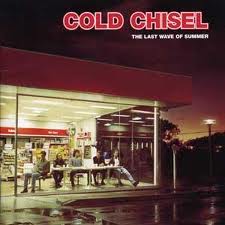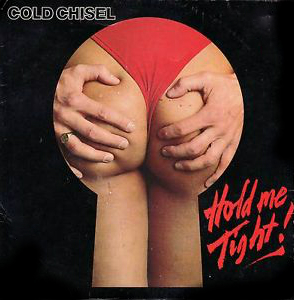
Cold Chisel are an Australian pub rock band, which formed in Adelaide in 1973 by mainstay members Ian Moss on guitar and vocals, Steve Prestwich on drums and Don Walker on piano and keyboards. They were soon joined by Jimmy Barnes on lead vocals and, in 1975, Phil Small became their bass guitarist. The group disbanded in late 1983 but subsequently reformed several times. Musicologist Ian McFarlane wrote that they became "one of Australia's best-loved groups" as well as "one of the best live bands", fusing "a combination of rockabilly, hard rock and rough-house soul'n'blues that was defiantly Australian in outlook."

"Khe Sanh" is the debut single by Australian rock band Cold Chisel, released in May 1978 as a 45 rpm single, and named after the district capital of Hướng Hóa District, Quảng Trị Province, Vietnam. Written by pianist Don Walker, "Khe Sanh" concerns an Australian Vietnam veteran dealing with his return to civilian life. According to Toby Creswell's liner notes for the band's 1991 compilation album Chisel, the song is also a story of restless youth.

"Flame Trees" is a song by Australian pub rock band Cold Chisel from their 1984 album Twentieth Century. One of their best known songs, it was written by drummer Steve Prestwich and keyboardist Don Walker. On its release it reached No. 26 on the Kent Music Report Singles Chart. It resurfaced in August 2011 due to download sales, peaking at No. 54 on the ARIA chart.

The Last Wave of Summer is the sixth studio album by Australian pub rock band, Cold Chisel. It was released in October 1998 and reached number-one on The Australian ARIA Charts. It was the band's first studio album in 14 years.

Breakfast at Sweethearts is the second studio album by Australian pub rock band Cold Chisel, released in February 1979. It spent 32 weeks in the national charts, reaching a peak of number 4.

"When the War Is Over" is song by Australian band Cold Chisel from their 1982 album Circus Animals. The song was written by drummer Steve Prestwich and issued as the third single from the album, peaking at number 25 on the national singles chart, and also resurfaced in August 2011 due to download sales.

East is the third studio album by Australian pub rock band Cold Chisel, released in June 1980. The album peaked at No. 2 and spent 63 weeks on the national chart. It was the biggest-selling Australian album release of the year. It was the only Cold Chisel album to chart in America, reaching 171 on the Billboard 200. It also reached number 32 on the New Zealand charts.

Circus Animals is the fourth studio album by Australian band Cold Chisel, released on 8 March 1982. It was recorded and mixed at Paradise Studios and EMI Studios 301, Sydney, between September and December 1981. It reached number one on the Australian charts, remaining in the charts for 40 weeks, and also topped the New Zealand charts. The working title for the album was "Tunnel Cunts".

Swingshift is a live album released by Australian band Cold Chisel in 1981. It was their first album to reach No. 1 on the Australian chart, debuting there in its first week. It peaked at number 9 in New Zealand. A press release said the title referred to, "the midnight to dawn shift that the staff in asylums dread: the hours when the crazies go crazy."

Twentieth Century is the fifth and final studio album by Australian band Cold Chisel until the group reformed in 1998. The album was written and recorded over various sessions during the period of the band's break-up and during breaks in their final tour. It was released in early 1984 and peaked at No. 1 on the Australian albums chart, their third consecutive album to do so. It charted for a total of 46 weeks.

"Saturday Night" is a 1984 single from Australian rock band Cold Chisel, the second released from the album Twentieth Century and the first to be issued after the band's official break-up. The vocals are shared between Ian Moss and Jimmy Barnes. It just missed out on becoming the band's third Top 10 single, stalling at number 11 on the Australian chart for two weeks, but it remains one of Cold Chisel's highest charting songs.
"My Baby" is a 1980 single from Australian rock band Cold Chisel, the third released from the album East and the first of the band's singles not to be written by pianist Don Walker. This was the only track credited solely to bass player Phil Small on any of the band's albums apart from "Notion For You" on the 1994 rarities album Teenage Love.

"You Got Nothing I Want" is a 1981 single from Australian rock band Cold Chisel, the first released from the album Circus Animals. One of the band's heaviest and most aggressive songs, which was written by singer Jimmy Barnes in response to the treatment they received at the hands of a record company executive during a U.S. tour earlier in the year. Don Walker said, "After we came back, Jim wrote 'You Got Nothing I Want' more or less as a personal tribute to Marty Schwartz." "You Got Nothing I Want" was also the first song on the album, and representative of the different sound Cold Chisel was attempting on Circus Animals in a conscious effort to move away from the slick commercial pop rock of East. It spent 19 weeks in the national charts, peaking at number 12.

"Choirgirl" is a song by Australian rock band Cold Chisel, released as the lead single from their third studio album East (1980) in November 1979. A ballad written by Don Walker with an R&B influenced melody, the song marked the first time the band had recorded with producer Mark Opitz. It peaked at No. 14 in Australia on the Kent Music Report.

"Forever Now" is a song by Australian rock band Cold Chisel. The second single from the album Circus Animals, it was the first Cold Chisel single to be written by Steve Prestwich. The song reached number two in New Zealand and number four in Australia, becoming the band's highest chart placement. In the United States, the song was titled "Forever Now ".

"Hold Me Tight" is a 1983 song from Australian rock band Cold Chisel, and appeared on the album Twentieth Century. Released as double A-side single with No Sense it reached number 14 in the Australian charts. Although the song charted, it failed to receive much radio airplay and didn't appear on any later greatest hits compilations.
"Goodbye (Astrid Goodbye)" is a 1978 single from Australian rock band Cold Chisel. Written by keyboardist Don Walker and vocalist Jimmy Barnes, it was released as a single in 1978, peaking at number 65 on the Australian charts. It appeared as a track on the 1979 album Breakfast at Sweethearts.

"No Sense" is a 1983 song from Australian rock band Cold Chisel, and appeared on the album Twentieth Century. Released as double A-side single with "Hold Me Tight" it reached number 14 in the Australian charts. Receiving more radio airplay of the two songs on the single, it appeared on Cold Chisel's early greatest hits compilations. It has been described as being reggae or "almost ska."
"Breakfast at Sweethearts" is a song from Australian rock band Cold Chisel. Written by keyboardist Don Walker, it was released as a single in 1979, peaking at number 63 on the Australian charts. It appeared as a track on the album of the same name.

"The Things I Love in You" is a song by Australian rock band Cold Chisel. It was released in August 1998 as the lead single from their sixth studio album, The Last Wave of Summer (1998). The song peaked at number 10 in Australia and 43 in New Zealand.



















